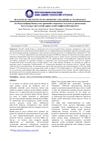
Women with a certain type of hair loss have more copper in the back of their head than the front, and treatment can normalize hair but not copper levels.
 December 2022 in “Himi, himijn tehnologijn hùrèèlèngijn èrdèm šinžilgèènij bùtèèl”
December 2022 in “Himi, himijn tehnologijn hùrèèlèngijn èrdèm šinžilgèènij bùtèèl” Hair products with copper and zinc enriched yeast made hair thicker and denser.
 15 citations,
January 2016 in “Przeglad Menopauzalny”
15 citations,
January 2016 in “Przeglad Menopauzalny” Eating a balanced diet with specific nutrients is important for menopausal women to manage hair loss.
14 citations,
January 2016 in “International Journal of Trichology” Many women with hair loss also have thyroid issues, high blood pressure, and low Vitamin D.
 September 2021 in “Journal of the Egyptian Women's Dermatologic Society (Print)”
September 2021 in “Journal of the Egyptian Women's Dermatologic Society (Print)” The study concluded that low iron and vitamin D levels in women might play a role in chronic hair loss, despite no significant difference between those with and without hair loss.
 3 citations,
August 2022 in “JAAD international”
3 citations,
August 2022 in “JAAD international” Taking a daily multivitamin may be enough to promote hair growth in people with alopecia.
3 citations,
December 2019 in “Biomaterials Research/Biomaterials research” Calcium and magnesium in hair increase with age and are higher in adult women.
2 citations,
January 1986 in “PubMed” PIXE is an effective method to analyze hair's elemental composition.

An infant with a zinc deficiency skin disorder improved with zinc treatment.
23 citations,
February 2017 in “Journal of dermatology” Low serum levels of zinc and selenium may increase the risk of alopecia areata.
Adding zinc to papaya extract speeds up wound healing.
 January 2013 in “kerbala journal of pharmaceutical sciences”
January 2013 in “kerbala journal of pharmaceutical sciences” Low zinc levels are strongly linked to hair loss in adult premenopausal women.
 September 2022 in “JAMC. Journal of Ayub Medical College, Abbotabad, Pakistan/Journal of Ayub Medical College”
September 2022 in “JAMC. Journal of Ayub Medical College, Abbotabad, Pakistan/Journal of Ayub Medical College” A boy with a rare skin condition improved quickly after starting zinc supplements.

Zinc levels and lymphocyte counts might be important in heart disease development.
 January 2017 in “International journal of clinical & experimental dermatology”
January 2017 in “International journal of clinical & experimental dermatology” Eating a balanced diet with vitamins, micronutrients, and antioxidants is important for hair health and can help with hair loss.

Supplements improve health, appearance, and athletic performance.
 December 2022 in “Journal of Education, Health and Sport”
December 2022 in “Journal of Education, Health and Sport” COVID-19 can cause hair loss, often treated effectively with a combination of supplements and topical treatments.
Taking supplements after sleeve gastrectomy surgery can reduce hair loss by addressing nutritional deficiencies.
January 2005 in “Farmaceutski glasnik” Minoxidil and finasteride are key treatments for hair loss.
 November 2024 in “Journal of Education Health and Sport”
November 2024 in “Journal of Education Health and Sport” Microneedling, PRP therapy, and pharmacological treatments show promise for hair loss, but more research is needed.
 39 citations,
September 2013 in “Journal of Cosmetic Dermatology”
39 citations,
September 2013 in “Journal of Cosmetic Dermatology” Herbs can potentially treat hair loss by inhibiting a key enzyme and promoting hair growth, and deficiencies in zinc, biotin, and iron are linked to hair loss.
1 citations,
January 2017 in “Annals of dermatology/Annals of Dermatology” Mineral levels in hair don't significantly affect the severity of atopic dermatitis in children.
 3 citations,
February 2005 in “Journal of Quantitative Spectroscopy & Radiative Transfer/Journal of quantitative spectroscopy & radiative transfer”
3 citations,
February 2005 in “Journal of Quantitative Spectroscopy & Radiative Transfer/Journal of quantitative spectroscopy & radiative transfer” Iron and zinc levels in hair are not linked to hair loss from chemotherapy.
 January 2024 in “JAAD case reports”
January 2024 in “JAAD case reports” MSUD patients need careful monitoring of amino acids and zinc to prevent severe symptoms.
 December 2024 in “PubMed”
December 2024 in “PubMed” The supplement improved hair density and was safe to use.
 January 2024 in “Zenodo (CERN European Organization for Nuclear Research)”
January 2024 in “Zenodo (CERN European Organization for Nuclear Research)” The conclusion is that certain traits, including perceived facial aging and BMI, are linked to perceived youthfulness differently in men and women.
 January 2024 in “Zenodo (CERN European Organization for Nuclear Research)”
January 2024 in “Zenodo (CERN European Organization for Nuclear Research)” The conclusion is that certain traits, including perceived facial aging and BMI, are linked to how youthful people look, with some differences between males and females.
 9 citations,
March 2022 in “Antioxidants”
9 citations,
March 2022 in “Antioxidants” Synthetic antioxidants are effective, cheap, and stable, with some like zinc and cholecalciferol reducing child and cancer deaths, but the safety of additives like BHA, BHT, TBHQ, and PEG needs more research.
13 citations,
April 2019 in “International journal of molecular sciences” Acyzol could help treat conditions caused by zinc deficiency.
 21 citations,
January 2014 in “Dermatology Research and Practice”
21 citations,
January 2014 in “Dermatology Research and Practice” Hair and serum levels of zinc, copper, and iron are similar in people with alopecia areata and healthy individuals.




















